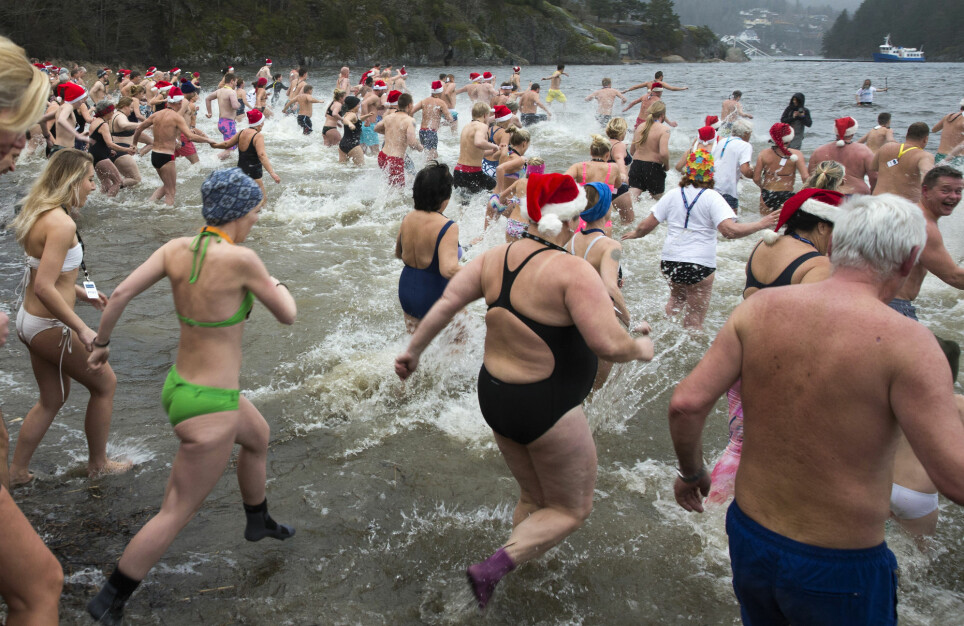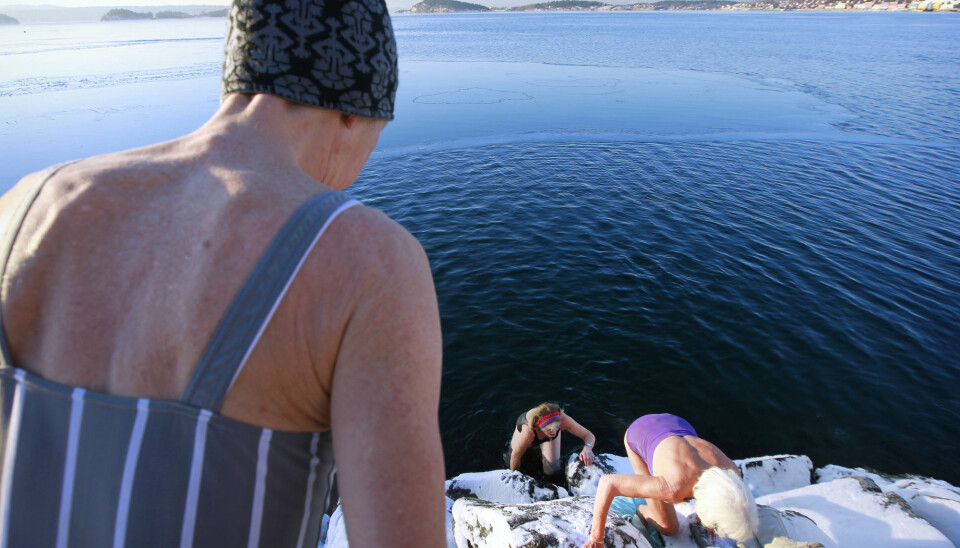
Is cold water swimming in the winter healthy?
ASK A RESEARCHER: Winter swimming has become popular in Norway. But what does the research have to say about this?
Maja-Lisa Løchen, a cardiologist and professor of preventive medicine at UiT – The Arctic University of Norway in Tromsø has helped ScienceNorway.no review the recent research on winter swimming.
Right to the main question:
Is cold water winter swimming healthy or is it actually dangerous?
For starters, Løchen points out that studies on this topic are small, few and far between.
She thinks the most interesting aspect is perhaps how winter swimming can affect people's psyche.
Prevent depression?
An obvious factor when you throw yourself into ice-cold water in winter is a feeling of mastery.
The feeling of mastering something can in turn help increase your quality of life. A better quality of life can certainly help prevent and possibly treat depression.
The shock experience from the cold water may also affect hormones that are important for our mental well-being.
“The psychological aspect of winter swimming is definitely interesting,” says Løchen.

The most important advice from the Tromsø researcher however, is that people with untreated cardiovascular disease should stay away from winter swimming.
If you have epileptic seizures or a tendency to faint, you shouldn’t attempt polar swims, either.
Løchen adds that some drugs, like beta-blockers, can make cold water swimming quite uncomfortable and cause so-called “dead fingers.”
“And never swim alone in ice-cold water,” she warns.
Winter swimming can harden the body
Hippocrates, considered the father of medicine, was interested in what cold and hot water can do to our bodies.
Modern-day Greek (and Finnish) researchers are perhaps the most actively plumbing this field of research. A group of researchers at universities and hospitals in Athens conducted a study and concluded that winter swimming seems to have several positive aspects.

But like Maja-Lisa Løchen, the Greek researchers presuppose that the individuals who dive into cold water aren’t dealing with heart problems.
The researchers view the appeal for winter swimmers of hardening their bodies in cold water as particularly positive. This experience increases if you swim regularly in winter, say the researchers.
The winter swimmers in the study felt more energetic and upbeat compared to a control group.
Rheumatism and fibromyalgia
In other studies, people with rheumatism, fibromyalgia or asthma who swim in winter told the researchers that they experience helpful pain relief, less fatigue and a better mood generally.
Some studies claim to be able to demonstrate a reduction in respiratory infections in people who swim in winter. However, this finding could be influenced by the fact that winter swimmers may already be in better health at the outset than other people.
The Greek researchers encourage approaching winter swimming gently and gradually.
Make sure to acclimate your body to the activity. And always make sure other people are present who can help you in an emergency.
Cold shock is one risk of winter swimming and may cause you to lose muscle and mental function. Swimming in winter also includes the danger of severe hypothermia if your core body temperature drops below 35 degrees Celsius.
Go a little slow
In another winter swimming study, researchers from Switzerland, Poland, Russia, USA, Canada and Greece joined forces to see what the existing research in this area can tell us about winter swimming – or ice swimming as it’s also called.
They concluded that swimming in the winter in water that stays below 5 degrees Celsius can have more positive than negative aspects, provided that the swims are undertaken by people in good health who take it nice and slow.
By gradually getting used to the cold water, you reduce the risk of cold shock, hypothermia and drowning.
Danger to the heart
Løchen notes that the researchers in this study explain the different stages your body goes through after you plunge into ice-cold water.
Your breathing and heart rates increase and you cool down during the first three minutes you’re in the water, which can lead to fainting. If you’re predisposed, this phase can also trigger a blood clot or severe heart rhythm disturbances. This can be fatal.
After three minutes of cold water exposure, your nerves and muscles really begin to feel the cooling.
After 30 minutes in the water, you risk life-threatening hypothermia.
“Some people who die simply lose the ability to gauge their situation due to the effect that cooling can have on the brain,” Løchen says.
“Remember that you can become lethargic, your swimming skills may decrease and then you could drown,” she adds.
Warming yourself back up is important when you get out of the water. In Finland, winter bathing is often combined with the sauna.

Might trigger hormone release
If you want to jump into winter swimming, start a little cautiously.
“Take it gradually and always swim with someone else. If you let your body acclimate to the cold water over time and swim through the winter, then the researchers who’ve studied the topic believe that your body can get used to the cold,” says Løchen.
The international research group believes that in the long run, winter bathing might offer beneficial effects like a strengthened immune system, fewer respiratory infections, lower blood pressure and better cholesterol levels (lipid profile).
The researchers also point out the benefits of cold water swimming on mental health.
They note the study of one woman who struggled with severe depression and anxiety. Through weekly cold water swimming, she gradually experienced such great changes in her mood that after one year she was able to stop taking her medications completely. The researchers wonder if there might be a connection between swimming in cold water and the release of norepinephrine (also called noradrenaline) and endorphins, both hormones that can reduce mental stress and increase the body's experience of well-being.
Løchen repeats that the studies available on winter swimming are generally small and thus not particularly thorough.
The amount of reliable knowledge we can draw from these studies is limited. We would be able to gain more knowledge through more extensive studies that follow a large group of winter swimmers over time to assess the health effects, she says.
Translated by: Ingrid P. Nuse
References:
Antonis S. Manolis et al: Winter Swimming: Body Hardening and Cardiorespiratory Protection Via Sustainable Acclimation, Current Sports Medicine Reports, 2019. doi: 10.1249/JSR.0000000000000653.
Beat Knechtle et al: Cold Water Swimming—Benefits and Risks: A Narrative Review, Environmental Research and Public Health, 2020. doi: 10.3390/ijerph17238984
———































